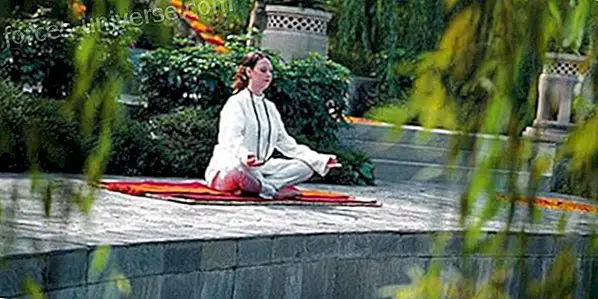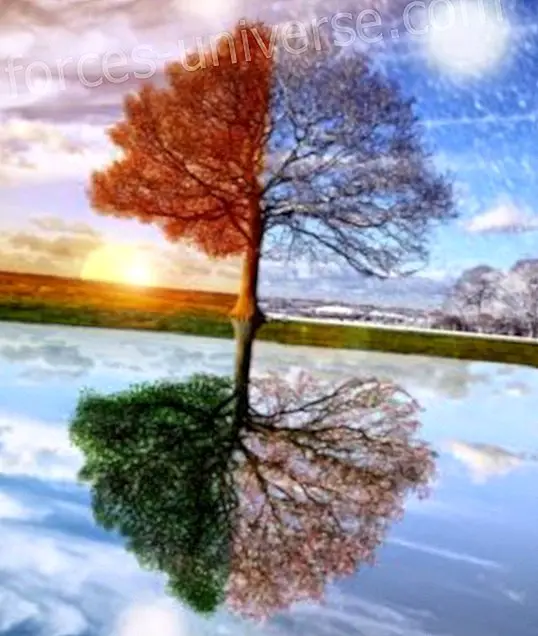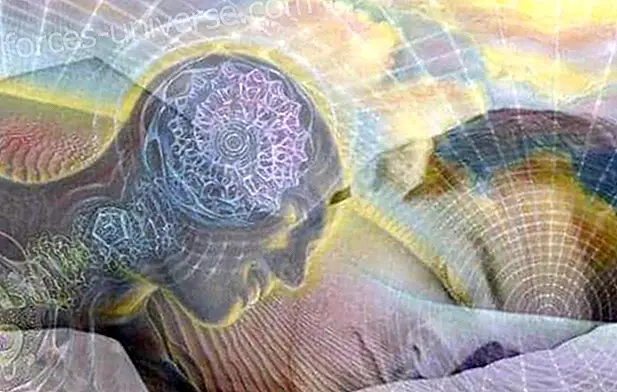There is a lot of confusion, in the various spiritual currents, when studying these concepts that are normally misinterpreted or with a tendency to mix them, so we intend to contribute to their clarification. They are not separated, they do not work in isolation in the human being, although they are complex, and for their study it is required to analyze them separately.
The spirit
We could understand it as the essence and implicit meaning of each being and its relation to the Cosmos, the meaning that each part has in relation to the All to which it belongs. This essential or spiritual part, in the human being, can be designated as the Higher Self, or real I, its part that belongs to the super-sensitive world and that remains hidden in our life of feelings and thoughts.
The Spirit, in itself, is eternal, which does not mean that it has neither beginning nor end, but that it is above any manifestation of space-time. We, as embodied humans, are space-time beings, and while we have emerged from a spiritual reality, we cannot really consciously relate to our own Spirit. We do not have access to the spiritual realm until we die, even though we are continually trying and talking about it. Paradoxically we can use our thinking, which is the authentic instrument of our spirit, against the same spiritual reality to which we belong, in use of our free will, ignoring it or denying it; for example through materialism.
Our Higher Self, which remains hidden, in itself can never function outside the spiritual laws that govern the cosmos, of Good, Truth and Beauty or Harmony, concepts that we will develop later.
The soul
In today's human being, it is the real center (not the Spirit) of all our mood when we are awake; We are constantly in contact with her, whether we want it or not, it has been that way for a long time and will continue to be so for millennia. The Soul is the center of our consciousness, characteristic that we share with animals, to a greater degree according to their evolutionary level, especially with higher animals, which although they have more developed their sensory perceptions they perceive the outside world and turn it into their own mood, inside, as we do, although in our case together with the faculties of memory and thought.
 We capture from the outside what comes to us through our sensory perceptions and in our interior we convert it, through our brain and neuro-sensory system, into our own psychic contents that we all possess and are governed by the laws of sympathy-antipathy. Things come to us and can leave us indifferent, if we do not identify with them, or they can produce attraction or rejection, in different degrees according to our interest. First of all they produce feelings and then feelings. All this is the way in which the content of the external objective world becomes personal empirical experience, part of the soul, sensory, feeling and affective content.
We capture from the outside what comes to us through our sensory perceptions and in our interior we convert it, through our brain and neuro-sensory system, into our own psychic contents that we all possess and are governed by the laws of sympathy-antipathy. Things come to us and can leave us indifferent, if we do not identify with them, or they can produce attraction or rejection, in different degrees according to our interest. First of all they produce feelings and then feelings. All this is the way in which the content of the external objective world becomes personal empirical experience, part of the soul, sensory, feeling and affective content.
On many occasions this process does not end there, but I may need to understand it, not only to experience it, and then I give it the thought. We always have the need to search and put a concept to each perception, which we do immediately. Eg: before a noise (perception) we add: "exhaust pipe" (concept), etc., we routinely seek a conceptual explanation to each sensory perception, almost always by monotonous repetition of the concepts already known. The soul associates concepts that correspond to each perception, correct or not, but that are satisfactory at that time. It is something necessary, but that we cannot consider as thought processes.
The world of thoughts
Thought is the essential part, as a spiritual activity that relates to our physical-material body through the brain and neuro-sensory system. It is the intellectual thought adapted to the physical world, that all normal people share to understand and understand the world. In general, it serves so that the group of sensory perceptions that I perceive are listening to a concert, reading, speaking, etc. together with a thought, make sense and generate the representations that always occur in, and are part of the Soul. The ones we remember form the conscious set of our whole life, which is why it is "human."
 We see then that in the Soul it is where the whole set of experiences occurs; sensations, representations, feelings, thoughts and volitional impulses, the strongest being that of feelings, because they are consubstantial to the Soul. The will and the thought, which also manifest in the Soul, are not exactly of the same substance. This makes us identify strongly with the human vital scenario that includes the whole world of feelings, with what the heart dictates, much more than with understanding through reflective thinking. This can be a trap since, in principle, the feelings today do not reveal to the human being the real and true.
We see then that in the Soul it is where the whole set of experiences occurs; sensations, representations, feelings, thoughts and volitional impulses, the strongest being that of feelings, because they are consubstantial to the Soul. The will and the thought, which also manifest in the Soul, are not exactly of the same substance. This makes us identify strongly with the human vital scenario that includes the whole world of feelings, with what the heart dictates, much more than with understanding through reflective thinking. This can be a trap since, in principle, the feelings today do not reveal to the human being the real and true.
The Sense and Essence of things
The laws that govern the physical physical world of plants, animal species, ecosystems, etc. they are open to the understanding of man through his thinking through natural science, physical-material laws that exclude transcendent or spiritual reality (for not being ) fica ) and that has its own laws. And yet the identification with the spirit in the material world runs parallel to the understanding of the laws that govern complete reality, whether in its spiritual, astral manifestation. ethereal or material.
But the lack of ability to perceive something does not mean that something does not exist, a fundamental philosophical premise that we should never forget.
The thought limited by the materialist culture limits human knowledge to the physical-material, but the thought itself is not limited by anything, even if we want to make the pedagogical system believe it. cultural tax.
When we read a book about spirituality we are accommodating in the soul when thinking of another person: it is a thought that can be thought by my thinking and that is supported by a perception that is not physical-sensory (thought it is suprasensible or spiritual, not sensory). If I think of the thought of another human being, my suprasensible thought perceives the suprasensible thought of another being, and becomes an organ of perception, just as sight or ear is, but Body of suprasensible perception not material, but supra-material. And yet to this activity of suprasensible thinking, which we use every day, we do not grant any value; It is a supersensitive force that I can, if I recognize it, voluntarily control.
On the contrary, the force of feelings, especially if they are instinctive, cannot be controlled voluntarily; Feelings occur in me without me wanting, and sometimes, despite me, pleasant or painful. They are semi-conscious processes.
 The impulses of the will are the most unconscious we have; Consider, for example, the metabolic forces that act in the heart and lungs, or in the digestive processes: they are strong, they help to live, but we do not control them.
The impulses of the will are the most unconscious we have; Consider, for example, the metabolic forces that act in the heart and lungs, or in the digestive processes: they are strong, they help to live, but we do not control them.
We see, therefore, that all the actions that take place in the human soul (perceptions, feelings, thoughts and volitions) is what we experience, it is the center of our personality and the stage in which it develops; It is not the essence. To perceive this, everyone can look inside and observe the dynamics of what is happening. The whole scenario in which our life unfolds is in that of the soul, where we can sacralize or demonize ourselves, according to the path we choose.
To a certain extent, in the soul, everything is governed by the psychic experiences of pleasure and pain; This is how the entity of the human being is expressed. The reaction in each soul to perceptions is completely individual, what seems right or wrong, we like or dislike, what we find interesting or not. To this we can oppose thinking as free and unprejudiced as possible and do a work of elaboration with each perception that the soul receives, of individual reflection that is already spiritual. If I do not do this spiritual work, the feelings are what will direct the processes of my life. It is about losing the automatism that normally directs our thinking and trying to consider each situation as if it were new and then reality can manifest itself as it is and not as I want to interpret it, and thus be able to act freely with what I consider the most correct ; This is what Steiner calls moral fantasy in his treatise "Philosophy of freedom " or of spiritual activity.
The I
Complex concept, also considered as Ego or Personality, is not the Spirit or what is known as the Spiritual Self, which remains hidden. In the human being it is the feeling of self-consciousness, the "I am a Self", something that in the vast majority of humanity did not exist until recently. We already know that in past times the prevailing feeling was that of group belonging to a family, tribe, race, nationality, lineage, etc., with greater roots as we go back in human evolutionary history. The human self, as manifested today, is the result of a process of change of consciousness that begins in the fifteenth century and that massively hatches throughout the twentieth century.
 The processes of individualization of the human being, characteristic of what we know as the time of the Conscious Soul in which we are, are essential so that man can conquer his freedom, although very problematic, given that the qualitative force that promotes selfhood is the of selfishness . We already know that the ideal of the ruling classes is that there are docile human groups, with ideologies, norms and traditions assumed by all, easily controllable and thus achieve the "social peace", so desired by all rulers and which means: " obey and shut up. " All of which is no longer typical of our era of awakening of individual consciousness and free use of thought and development of morality.
The processes of individualization of the human being, characteristic of what we know as the time of the Conscious Soul in which we are, are essential so that man can conquer his freedom, although very problematic, given that the qualitative force that promotes selfhood is the of selfishness . We already know that the ideal of the ruling classes is that there are docile human groups, with ideologies, norms and traditions assumed by all, easily controllable and thus achieve the "social peace", so desired by all rulers and which means: " obey and shut up. " All of which is no longer typical of our era of awakening of individual consciousness and free use of thought and development of morality.
There are individuals who are prone to be part of groups or associations, especially in the East, while others, especially in the West, what they want is to defend their own individual peculiarities, becoming independent of imposed norms, dogmas, beliefs and doctrines. Since 1900 there is a kind of fracture in which it is necessary for the human being to think, and therefore act in another way, based on an individualization process in which human rights are claimed. I get rid of the conditioning of the past by getting rid of doctrines and customs, assuming the content of my own soul and not depending on what others decide. It is a necessary process of "cleaning" but also produces a vacuum in many souls. It is a process that has to happen, whether we like it or not, in which the human being has to gain his freedom. It is a new situation for which we are not prepared, dangerous because we are bound to decide responsibly about our own life: What do I want to see, hear, learn and integrate freely in my soul?
But individualization can also lead to an individualistic selfishness in which other congeners are considered competitors or enemies to fight, or world of winners against losers, especially in the German-Anglo-Saxon culture with justification in the doctrines Lutheran-Calvinists. (Divine Predestination. Etc.)
The strength of the ego comes from the soul feeling itself inside the physical-material body, anchor for the soul, without which we would not have that feeling of being isolated from others, separated by the skin: inside is me. ”
Already in 1908 Steiner emphasized his cycle of lectures on the apocalypse of San Juan, in which it is this I that causes men to become emotionally hard and rigid looking to put at the service of this I of his all things and goods that They are at your disposal to appropriate a part of the collective heritage as a personal possession, striving to expel all others from their territory, fighting them, etc. That I is at the same time what gives the human being his independence, his intrinsic freedom and what enhances man, where his human dignity resides; It constitutes the germ of the divine in man and is the highest guarantor of the destiny of the human being. If he does not find the path of Love and encloses himself, he is at the same time the seducer who makes human beings fall into the abyss. Then it is the I that creates discord among people and leads them to the war of all against all, of individuals, classes, castes, sexes, and generations, not just between nations. It can lead to the most sublime, but also to the infernal. It is the "double-edged sword" of the Apocalypse.
The real Higher or Eternal Self
 Rudolf Steiner, the founder of Anthroposophy, tells us that “the self lives in the body and in the soul, but the spirit that lives in the self is something eternal. Everything in the "I" of the physical-material will disappear after death, but what that "I" has to do with the laws of the Spirit acquires the character of eternity ”. That is, in the eternal sense of reality, of the essence of Good (of whatever is convenient for the spiritual set), of Truth (according to spiritual reality), and of Beauty (in the sense that it is harmonic for the joint function of all the beings that make up the Cosmos). This work that we can do in the Conscious Soul is something that we can keep after our death, acquires the character of eternity.
Rudolf Steiner, the founder of Anthroposophy, tells us that “the self lives in the body and in the soul, but the spirit that lives in the self is something eternal. Everything in the "I" of the physical-material will disappear after death, but what that "I" has to do with the laws of the Spirit acquires the character of eternity ”. That is, in the eternal sense of reality, of the essence of Good (of whatever is convenient for the spiritual set), of Truth (according to spiritual reality), and of Beauty (in the sense that it is harmonic for the joint function of all the beings that make up the Cosmos). This work that we can do in the Conscious Soul is something that we can keep after our death, acquires the character of eternity.
In the current incarnation of man we can distinguish between the self-conscious Self, which we have already studied, and the Higher Self, which as a spiritual essence remains in the germinal state in the human being, produces a unique and passing partial manifestation of itself, and that after death he can integrate the experiences lived by the lower Self (ego or personality) into his eternal becoming. Steiner tells us that the Higher Self is not within the reach of man, that it has its existence beyond common consciousness.
Some additional considerations in response to questions from attendees.
In the egoic processes of individualization, manifestations that we can consider anti-social are necessarily based on the laws of affinity, or sympathy / antipathy. It is a technical issue, not moral. For example, in the process of speaking and listening when we speak we tend to constantly reaffirm ourselves (antipathy opposed to the openness or sympathy that listeners have to put in order to reach their self, and vice versa). The forces of feeling or affective effects of sympathy / antipathy (according to our affinities) in our judgments, which is not appropriate, since they move in the subconscious and cause erroneous judgments that will always be unilateral, subjective and partial. They cause images falsified by our prejudices in the affective. Vital antisocial currents in human society. However, the forces of thought move in consciousness and can lead us to reality.
Regarding the soul life, Steiner tells us that if we love someone, in reality what we love is the satisfaction produced by the emotional union with the other person (what is believed to be authentic love is an illusion), it is really self-love or disguised selfishness, the source of the strongest antisocial impulses. That is, what I love are the feelings so pleasant that I get when I approach another person, feelings in my soul that I want to repeat. When the sensory mood in my soul no longer causes me pleasure, it stops loving. It is not love, let alone spiritual love.
The exercise and experience of selfhood, in principle, separates us from others so that we can reaffirm ourselves. Therefore, it is necessary to correctly develop the yo before the storms of feelings, as a modeling force to work and cultivate. Between the selfishness of the self and the world, my conscience can overcome that automatic selfishness and begin to balance and temper that unilateral force.
We need the selfishness to be able to settle down and have an inner firmness (in the face of the chaos of sensations that overflow us), but also to be able to govern that internal ethical force to relate in a socially correct way by strengthening the noblest moral forces (of fraternity), cushioning one's own mood forces and being able to feel the pains and joys of other beings, thus giving rise to true love in human life.
 Spiritual reality is expressed in the physical world through true brotherly love that we can develop. Selfishness must be recognized in order to handle it. We can start by trying to develop the love of Truth : I don't have to constantly relate the content of my knowledge to my ego, how it affects me in life. Reality is as it is, regardless of me; I am one more among almost 7000 million incarnated human beings, but the Truth is Cosmic, it is above all as something universal global. It requires overcoming the personal human in any path of spirituality, what Steiner calls as `` self-denial in knowledge. '' I have the moral responsibility to work my self to aspire to contact the spiritual worlds, with the universal truths.
Spiritual reality is expressed in the physical world through true brotherly love that we can develop. Selfishness must be recognized in order to handle it. We can start by trying to develop the love of Truth : I don't have to constantly relate the content of my knowledge to my ego, how it affects me in life. Reality is as it is, regardless of me; I am one more among almost 7000 million incarnated human beings, but the Truth is Cosmic, it is above all as something universal global. It requires overcoming the personal human in any path of spirituality, what Steiner calls as `` self-denial in knowledge. '' I have the moral responsibility to work my self to aspire to contact the spiritual worlds, with the universal truths.
In summary , we have a soul where all our capacities are developed, that lives in a center that is the I am, formed by an egoism that allows me to become independent of all the traditional-cultural of the past so that I can freely develop a knowledge to through a free thinking that can contact the spiritual truths that will always be in direct relation with the Good (with the right thing for the whole of the Cosmos), with the Truth (with the real constitution and functioning of that Cosmos) and with the Beauty (or the harmony manifested in each part of that set).
We all have the appropriate structure to understand what we can do today correctly. Understand that I am a self, ego or personality, which is the center of a mood in which many stimuli are manifested, from my uncontrolled volitional impulses, from my feelings that are always biased on one side or the other, or from my thoughts controlled, the one I own today. And from there, from a chaotic structure, harmonize all this, the best you can, towards a balance, in a process that will indicate the way forward . What really matters is to feel the immortal, eternal essence, which has to be nourished by what spiritually and freely I can and want to contribute.
What we really need today is to understand how global reality works, not remaining outside the conventional social reality; being here, knowing how to integrate the spiritual values (not the mystics or religious learned or imposed) that are understandable and explainable so that everyone can practice them. The spiritual world needs many "I's" to be aware of this that the prevailing culture has stolen from us .
Miguel Angel Quinones
(Excerpt from a talk given by Miguel Ángel Quiñones at the “Centro de Luz” in Las Rozas, Madrid, on January 29, 2010).
http://www.revistabiosofia.com/index.php?option=com_content&task=view&id=295&Itemid=55






